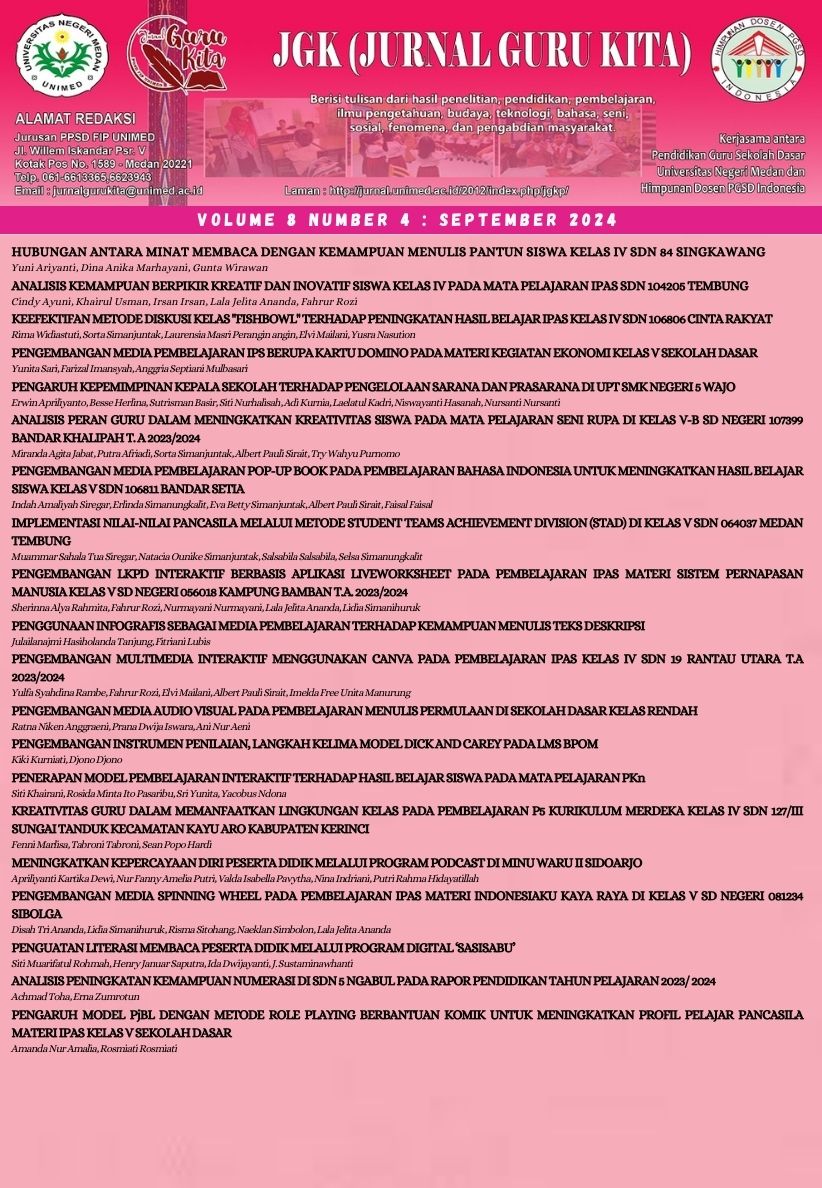KEEFEKTIFAN METODE DISKUSI KELAS "FISHBOWL" TERHADAP PENINGKATAN HASIL BELAJAR IPAS KELAS IV SDN 106806 CINTA RAKYAT
DOI:
https://doi.org/10.24114/jgk.v8i4.59106Keywords:
Efektifitas, Metode Diskusi Fishbowl, Hasil Belajar IPASAbstract
Penelitian ini bertujuan untuk mengetahui keefektifan metode diskusi kelas œfishbowl terhadap peningkatan hasil belajar IPAS kelas IV SDN 106806 Cinta Rakyat. Populasi penelitian ini adalah seluruh siswa kelas IV SD Negeri 106806 Cinta Rakyat yang berjumlah 88 orang dengan sampel 2 kelas yaitu kelas IV B (Kelas eksperimen) dan kelas IV C (Kelas kontrol) yang berjumlah 59 orang. Jenis penelitian adalah Quasi-Experimental Design dengan desain Nonequivalent Control Group Design. Teknik analisis data dilakukan dengan bantuan uji t . Hasil penelitian menunjukkan hasil belajar siswa kelas eksperimen dan kelas kontrol memiliki perbedaan yang signifikan yaitu nilai rata-rata posttest kelompok eksperimen sebesar 88,33 dan kelompok kontrol sebesar 71,72. Hal ini didukung oleh nilai N-gain yaitu kelompok eksperimen berada pada nilai 0,68 kategori (sedang) dan kelompok kontrol berada pada nilai 0,28 kategori (rendah). Selanjutnya hasil uji t menyatakan thitung (7,317) > ttabel (2,002) pada É‘= 0,05 N=57 atau Ha diterima. Hasil tersebut memberikan kesimpulan bahwa terdapat perbedaan rata-rata hasil belajar siswa atau dapat dikatakan metode pembelajaran diskusi œfishbowl efektif terhadap peningkatan hasil belajar IPAS pada siswa kelas IV SD Negeri 106806 Cinta Rakyat.References
Arikunto, S. (2016). Dasar-dasar Evaluasi Pendidikan (Edisi 2). Jakarta: PT Bumi Aksara.
Ningsih, S. Y., & Nurseha, N. (2018). Pengaruh Penerapan Strategi Pembelajaran Kolaboratif Fishbowl Terhadap Kemampuan Pemecahan Masalah Matematika Siswa Kelas VII SMP Negeri 6 Rengat. MES: Journal of Mathematics Education and Science, 3(2), 190-200. https://doi.org/10.30743/mes.v3i2.500
PUSPITA, W. E. (2020). EFEKTIVITAS MODEL FISH BOWL TERHADAP HASIL BELAJAR IPA PADA SISWAKELAS IV SDN 186 INPRES BONTO MANAI KABUPATEN MAROS (Doctoral dissertation, UNIVERSITAS BOSOWA). https://repository.unibos.ac.id/xmlui/handle/123456789/1314
Rahmadani, R. (2022). Metode Pembelajaran Fishbowl Dalam Meningkatkan Hasil Belajar Siswa Di SMP Swasta Sidikalang. Tajribiyah: Jurnal Pendidikan Agama Islam, 1(2), 114-120. https://ejurnal.univamedan.ac.id/index.php/Tajribiyah/article/view/368
Riowati, R., & Yoenanto, N. H. (2022). Peran guru penggerak pada merdeka belajar untuk memperbaiki mutu pendidikan di Indonesia. Journal of Education and Instruction (JOEAI), 5(1), 1-16. https://doi.org/10.31539/joeai.v5i1.3393
Rusman. (2012). Model - Model Pembelajaran. Depok : PT Rajagrafindo Persada
Silberman, Melvin L. (2013). Active Learning: 101 Cara Belajar Siswa Aktif. Edisi Revisi. Terjemahan Raisul Muttaqien. Bandung: Nuansa Cendekia.
Sugiyono. (2016). Metodelogi Penelitian Kuantitatif, Kualitatif Dan R&D. Bandung: PT. Alfabeta.
Downloads
Published
How to Cite
Issue
Section
License
Copyright (c) 2024 Rima Widiastuti, Sorta Simanjuntak, Laurensia Masri Perangin angin, Elvi Mailani, Yusra Nasution

This work is licensed under a Creative Commons Attribution-ShareAlike 4.0 International License.
Authors published with the JGK (Jurnal Guru Kita) agree to the following terms:
- Authors retain copyright and grant the journal the right of first publication with the work simultaneously licensed under a Creative Commons Attribution License (CC BY-SA 4.0) that allows others to share the work with an acknowledgment of the work's authorship and initial publication in this journal.
- Authors are able to enter into separate, additional contractual arrangements for the non-exclusive distribution of the journal's published version of the work (e.g., post it to an institutional repository or publish it in a book), with an acknowledgment of its initial publication in this journal.
- Authors are permitted and encouraged to post their work online (e.g., in institutional repositories or on their website) prior to and during the submission process, as it can lead to productive exchanges, as well as earlier and greater citation of published work. (See The Effect of Open Access)




























